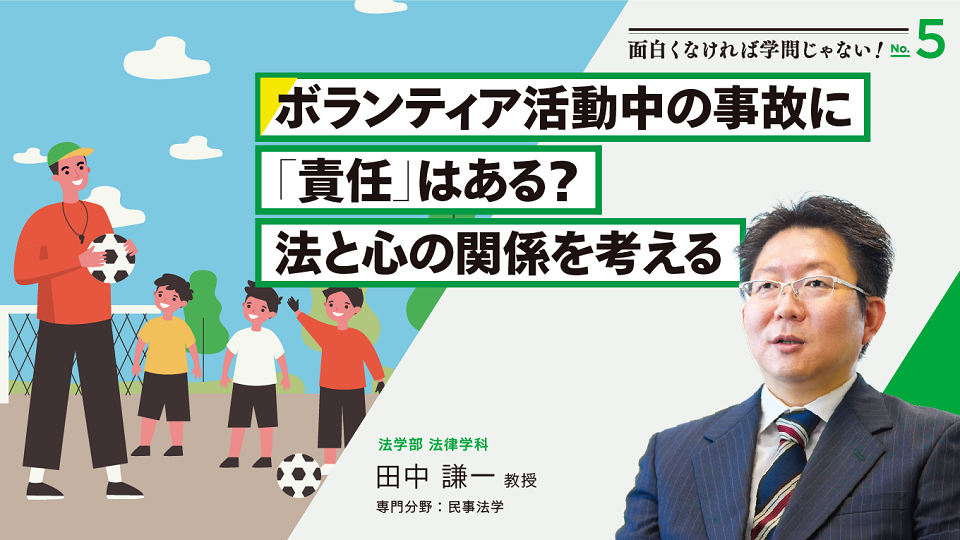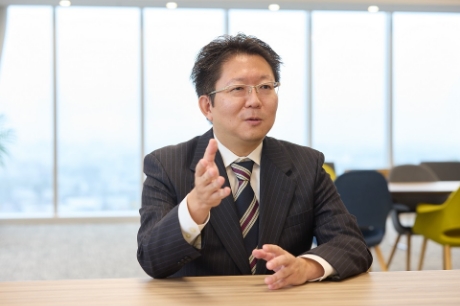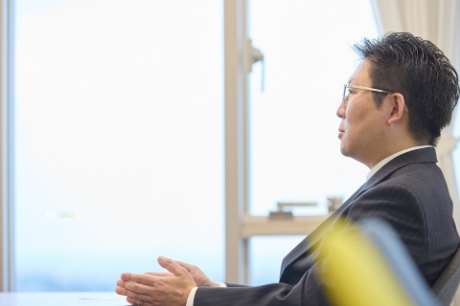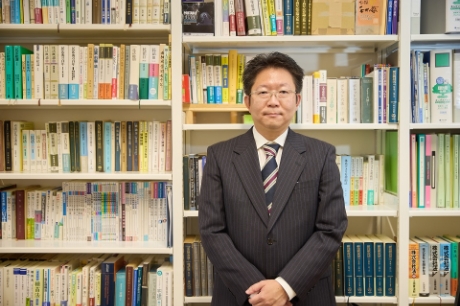
Accident during volunteer work
Is there any “responsibility”?
Considering the relationship between law and the mind
Is there any “responsibility”?
Considering the relationship between law and the mind


#Asia University research
TANAKA Kenichi Professor
Faculty of Law Department of Law
2024.01.24
In the series "If it's not interesting, it's not academia!", we introduce research content and anecdotes of Asia University faculty members. The fifth installment features Professor TANAKA Kenichi Faculty of Law Department of Law.

Focus on legal issues that are close to us
After many twists and turns, I left my alma mater, Chuo Graduate School, where I was shocked by the excellence and high level of awareness of my seniors and peers. Even if research the same field, I would never be able to compete with them. When I thought this, I thought that I should research a field of civil law that is not very interesting. That way, I might be able to do research that does not follow in the footsteps of others. When I was thinking this, I happened to notice a "partnership contract" that I was in charge of reporting at research meeting at university. When I studied civil law in my university days, I had heard that this was a different system from labor unions and cooperatives such as co-ops, but I could not imagine in what situations this contract is used in the real world. According to the provisions of the Civil Code, it is a contract used for multiple people to gather together and carry out a joint business, but in the first place, when people gather together and carry out a business on an ongoing basis, it is more convenient in many ways to establish an organization called a corporation, such as a company. Why is a "partnership contract" necessary? Are there groups of people who cannot establish a corporation? Such questions were the start of research.
Such a gathering of people is called an organization, and my research interest is directed towards the legal system related to organizations. However, since many research have long been research companies, which are organizations that operate "profit-making businesses," my research naturally turned to organizations that perform "non-profit businesses." The specific subject of my research was the civic groups that perform volunteer activities, which were created in response to events such as the Great Hanshin-Awaji Earthquake in 1995. In 1995, there were almost no ways for these so-called volunteer groups to be incorporated as corporations. However, as the importance of these activities became more widely recognized, the "Act to Promote Specified Non-Profit Activities," commonly known as the NPO Act, was enacted in 1998 by a member of parliament, granting corporate status to private non-profit organizations that perform social contribution activities. After that, as Japan experienced another hardship in the form of the Great East Japan Earthquake, the connection with "volunteer activities" became inseparable when thinking about organizations that perform non-profit businesses.
It raised important issues for society.
Accidents during volunteer activities
Accidents during volunteer activities

When you hear the word "volunteer," what kind of people and activities come to mind? Many people may think of the Great East Japan Earthquake that occurred when college students were children, or of the recovery and reconstruction support provided during natural disasters that have become more frequent due to global warming. Many volunteers also worked hard at the Tokyo Olympics, which were held in 2021 amid the COVID-19 pandemic. Even if they are not on a large scale, there are a wide variety of volunteer activities, such as volunteering for children and elderly people in the area where you live.
So, to what extent do you think a volunteer can be held responsible if, for example, a child or elderly person is injured or, unfortunately, killed during volunteer activities?
There were two court cases in the early 1970s that brought such volunteer "responsibility" into the public spotlight. In both cases, children died as a result of acts of good faith, and while no criminal penalties were imposed on the volunteers who carried out the activities, they were found liable for compensation in civil court.
Although the judgement states that even volunteers have a certain degree of responsibility to ensure safety, some may think that it is harsh to hold them legally responsible for unpaid service. This may certainly seem true from the volunteer's point of view. However, what about the family of the child who died? If it is determined that the volunteer has no responsibility at all because they are unpaid, they will surely be tormented by bitter feelings. When considering legal issues, it is also important to look at the "hearts" of people in different positions.
So, to what extent do you think a volunteer can be held responsible if, for example, a child or elderly person is injured or, unfortunately, killed during volunteer activities?
There were two court cases in the early 1970s that brought such volunteer "responsibility" into the public spotlight. In both cases, children died as a result of acts of good faith, and while no criminal penalties were imposed on the volunteers who carried out the activities, they were found liable for compensation in civil court.
Although the judgement states that even volunteers have a certain degree of responsibility to ensure safety, some may think that it is harsh to hold them legally responsible for unpaid service. This may certainly seem true from the volunteer's point of view. However, what about the family of the child who died? If it is determined that the volunteer has no responsibility at all because they are unpaid, they will surely be tormented by bitter feelings. When considering legal issues, it is also important to look at the "hearts" of people in different positions.
Knowing the limitations of "volunteerism"
Improve quality
Improve quality

These court cases have led to a widespread understanding in society that volunteers are liable for a certain amount of damages, but that this liability is reduced because volunteer work is unpaid. However, a closer look at the facts of the cases and the court rulings raises doubts about such a simple understanding of "responsibility" in volunteer activities.
My thoughts about volunteer work, an unpaid activity, is that we should clearly define the "limits" that volunteers can take responsibility for. For example, many volunteer staff work in large hospitals and welfare facilities, but due to a labor shortage, volunteers are sometimes forced to take over tasks that should be handled by specialized staff. According to an acquaintance of mine who is a social welfare research in Northern Europe, "Japan relies too much on volunteers," and as the super-aging population progresses, we need to rethink the current situation in which volunteers are forced to shoulder the contradictions of the medical and social welfare systems. It will become essential for society as a whole to define the "limits" of volunteer work.
On the other hand, now that volunteer activities have spread widely, I think it is becoming important to have leaders who can take the lead in improving the quality of volunteering. Ideally, this role should be played by people in their 40s and 50s who are familiar with social structures and the human heart, but the reality is that this is difficult because they are the managerial generation and are busy with work. It would be great if the number of volunteers in this generation increased as work style reforms progress, but it is important to start step by step with what you can do, rather than wishing for something that does not exist.
However, what I want to tell young people is that they should not think of volunteering as something too big, but should just think of it as "giving a helping hand to those in need." I think that the "call-out and support" campaigns that railway companies are running these days are ideal volunteer activities that people can do easily. "The courage to take a step forward" for those in need. I think that this is the essence of volunteering.
My thoughts about volunteer work, an unpaid activity, is that we should clearly define the "limits" that volunteers can take responsibility for. For example, many volunteer staff work in large hospitals and welfare facilities, but due to a labor shortage, volunteers are sometimes forced to take over tasks that should be handled by specialized staff. According to an acquaintance of mine who is a social welfare research in Northern Europe, "Japan relies too much on volunteers," and as the super-aging population progresses, we need to rethink the current situation in which volunteers are forced to shoulder the contradictions of the medical and social welfare systems. It will become essential for society as a whole to define the "limits" of volunteer work.
On the other hand, now that volunteer activities have spread widely, I think it is becoming important to have leaders who can take the lead in improving the quality of volunteering. Ideally, this role should be played by people in their 40s and 50s who are familiar with social structures and the human heart, but the reality is that this is difficult because they are the managerial generation and are busy with work. It would be great if the number of volunteers in this generation increased as work style reforms progress, but it is important to start step by step with what you can do, rather than wishing for something that does not exist.
However, what I want to tell young people is that they should not think of volunteering as something too big, but should just think of it as "giving a helping hand to those in need." I think that the "call-out and support" campaigns that railway companies are running these days are ideal volunteer activities that people can do easily. "The courage to take a step forward" for those in need. I think that this is the essence of volunteering.
Diversity and fantasy in law and society

By the way, some people may think that "studying law" means memorizing the seemingly dry articles written in the Roppo Zensho (Complete Collection of Laws). However, that is only a small part of studying law.
A famous German legal scholar has stated that in addition to "understanding" and "judgment," "imagination" is also a quality required of lawyers. In other words, it is the imagination to envision how the law would be used in real-life situations. When reading actual court decisions, it is not uncommon to find yourself thinking, "Truth is stranger than fiction!" There are many different types of people in the world, and many different incidents occur. For legal professionals and legal scholars who are required to view conflicts of values impartially, I believe it is essential to have the imagination to understand the breadth of the human mind and the diversity of society, and to envision every detail of the structure of an incident.
In my case, in addition to studying and research at university and Graduate School, my hobby of engrossed in fantasy novels, such as Tolkien's "The Lord of the Rings," may have helped sharpen my imagination (incidentally, Tolkien was research of philology and linguistics). Through the socially conscious fantasy genre, which I was particularly passionate about from high school to university, I came into contact with diverse values, such as homosexuality, science and technology and ethics, gender discrimination, and ethnic conflict.
Shouldn't academic study have the same "excitement" of catching a glimpse of a new world as I felt when reading fantasy? Behind the seemingly dry rules of law are people's lives and various "feelings". Of course, coming into contact with a new world is not always a pleasant experience, because there is also human "sorrow" and "suffering". However, including these things, the academic discipline of social sciences, including law, is a driving force for taking an interest in society. I believe that my role as a university professor is to help young people, who will be responsible for society in the future, feel the "excitement" of learning about society.
A famous German legal scholar has stated that in addition to "understanding" and "judgment," "imagination" is also a quality required of lawyers. In other words, it is the imagination to envision how the law would be used in real-life situations. When reading actual court decisions, it is not uncommon to find yourself thinking, "Truth is stranger than fiction!" There are many different types of people in the world, and many different incidents occur. For legal professionals and legal scholars who are required to view conflicts of values impartially, I believe it is essential to have the imagination to understand the breadth of the human mind and the diversity of society, and to envision every detail of the structure of an incident.
In my case, in addition to studying and research at university and Graduate School, my hobby of engrossed in fantasy novels, such as Tolkien's "The Lord of the Rings," may have helped sharpen my imagination (incidentally, Tolkien was research of philology and linguistics). Through the socially conscious fantasy genre, which I was particularly passionate about from high school to university, I came into contact with diverse values, such as homosexuality, science and technology and ethics, gender discrimination, and ethnic conflict.
Shouldn't academic study have the same "excitement" of catching a glimpse of a new world as I felt when reading fantasy? Behind the seemingly dry rules of law are people's lives and various "feelings". Of course, coming into contact with a new world is not always a pleasant experience, because there is also human "sorrow" and "suffering". However, including these things, the academic discipline of social sciences, including law, is a driving force for taking an interest in society. I believe that my role as a university professor is to help young people, who will be responsible for society in the future, feel the "excitement" of learning about society.
Related Links
- Faculty of Law TOP
- Faculty Faculty of Law Faculty Introduction
- Introduction to Faculty of Law Department of Law
- Faculty of Law Department of Law Four Years of Learning
- Faculty of Law Department of Law Registration Model
- Faculty of Law Department of Law Class Introduction
- Faculty of Law Department of Law Seminar
- Faculty Faculty of Law Department of Law Employment Measures
- Faculty introduction of Faculty of Law Department of Law